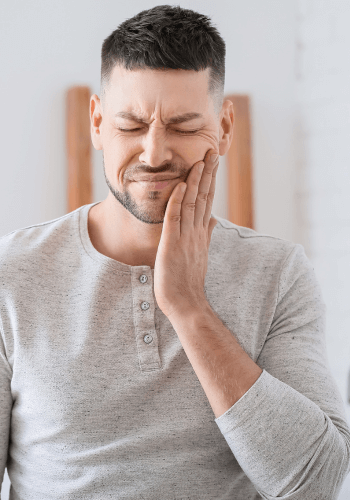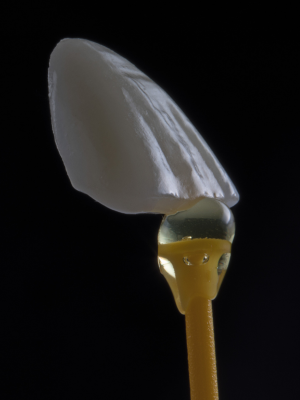How Can I Save My Loose Tooth?
Can an emergency dentist save my loose tooth, or do I need an oral surgeon? I tripped over a cement parking space block and fell face forward. That was two weeks ago, and now I’m starting to feel my left front tooth is loose. I chipped two other teeth, but they did not hurt. I was flossing two nights ago and thought the tooth was loose, but now, I am sure. My regular dentist is almost 45 minutes away, but I haven’t seen him in two years because of ongoing problems with a crown that he couldn’t resolve. Should I see an emergency dentist for this, or can I schedule my regular dentist to be referred to an oral surgeon? I hope I don’t need another crown because the one I got two years ago still gets sensitive sometimes when I chew on the left side of my mouth. Thank you. Evan
 Evan,
Evan,
If your tooth is loose, you have a dental emergency. It is best to see your dentist, but if the distance is a problem, find a nearby experienced dentist who takes emergency cases.
How Can You Save a Loose Tooth?
Before treating a loose tooth, your dentist will examine it and take an X-ray. A dentist can stabilize the tooth by splinting or bonding it to adjacent teeth. Splinting or bonding will help tooth ligaments heal on their own. A dentist will also check your tooth for internal damage. If the tooth pulp is affected, after the ligaments heal, you will need root canal treatment to remove the dying tooth pulp. Root canal treatment will prevent infection and further problems with the tooth. The dentist will protect your tooth with a dental crown.
Until you see your dentist, take these precautions:
- Avoid chewing on the damaged tooth
- Do not touch it or wiggle it
- Do not floss between it
- Eat soft food
- Take anti-inflammatory medication to reduce swelling and promote healing
Healing will take a few weeks if your tooth ligaments are mildly damaged. More extensive damage can take months. You will have periodic checkups to ensure the healing is progressing well. Closely follow your dentist’s instructions for caring for your tooth after the dentist stabilizes it.
If your current dentist placed your crown last year, and you still have discomfort, consider consulting with a dentist with advanced occlusion and bite training. Preparing your tooth precisely and ensuring the crown fits well prevents sensitivity, discomfort, and potential TMJ symptoms. You can also ask the dentist to check your existing crown to determine why it is causing sensitivity.
Rocky Hill, Connecticut, cosmetic dentist Dr. Thaddeus Michalski sponsors this post. Read how he strives to provide patients with some of the best dental care in Rocky Hill.
Why Do I Have Sour Taste After Getting Porcelain Veneers?
I received porcelain veneers in March of this year. In May, I began to get a sour taste in my mouth. The closest way I can describe it is like spoiled milk or sour dairy products. It’s strange. I am very serious about my oral hygiene. I floss twice daily if I feel anything foreign between my teeth and gums. So that is not the issue. I also brush my teeth twice daily, rinse my mouth out after I eat, and sometimes swish a little mouthwash around in my mouth to try to neutralize the sour taste, but it isn’t working.
My sister told me to try brushing my tongue, but that still doesn’t help. I am not an alarmist, but I am sure the sour taste is worsening. My dentist checked all my eight veneers, but she didn’t see anything wrong. My dentist is asking me about changes in my diet and medication. She suggested that I see my primary care doctor. I don’t think that’s the issue, though. Is there something about the porcelain veneers that my dentist might have missed that could be causing the problem? Thanks for your help. Kassady
Kassady – We understand your concern. A consistent sour taste in your mouth can be annoying. The issue is possibly an oral issue, which may be caused by tooth decay or an infection.
What Can Cause a Sour Taste in Your Mouth?

A change in diet or medication can cause unusual tastes in your mouth. Other causes of a sour taste include:
- Dehydration
- Infections or illness
- Poor oral hygiene
- Gastroesophageal reflux disease
- Advancing age
- Cancer treatment
However, if the sour taste didn’t start until you received porcelain veneers, microleakage behind your veneers may be causing your concerns.
Microleakage facts:
- Microleakage occurs when, during the bonding process, there is a gap left between the veneer and your tooth.
- Food or liquid can leak behind the veneer and breed bacteria.
- Decay will eventually result, and it can result in bad breath or a bad taste in your mouth.
It is best to take control of your oral health and get a second opinion from a skilled cosmetic dentist. If your veneers are faulty, an advanced cosmetic dentist can carefully remove, clean, and bond them back on. If the cosmetic dentist agrees that your porcelain veneers are correctly bonded and are not causing the bad taste in your mouth, they will further investigate.
You may need to see your primary care doctor if there is no problem with your dental work. It’s essential to address the issue promptly to prevent the underlying cause from worsening.
Dr. Thaddeus Michalski of Rocky Hill, Connecticut, sponsors this page. Read how he strives to provide patients with some of the best dental care in Rocky Hill.


